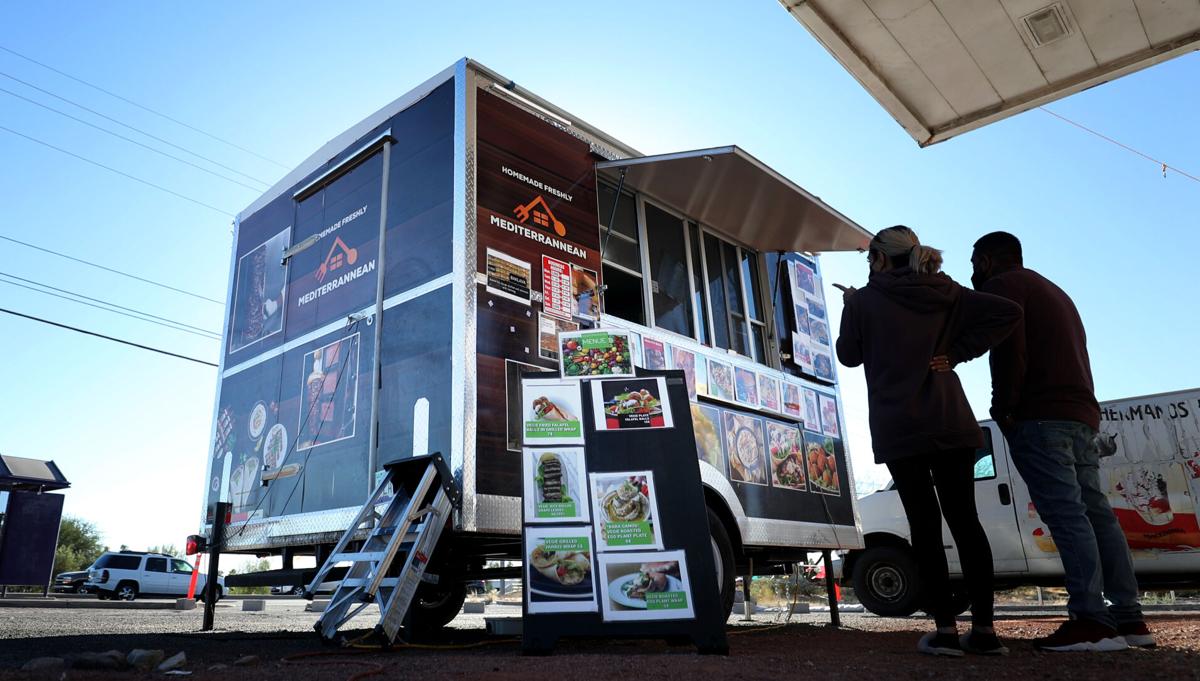Food truck gatherings in Tucson could soon be more plentiful, and safer under a new city ordinance that makes expectations more consistent for vendors and customers.
The ordinance amends sections of the city’s development code to allow for “congregate food truck courts” to be developed across Tucson. The City Council unanimously approved the measure at its meeting Tuesday night.
Permanent food truck courts did not previously have a separate land use classification. That was allowable under Tucson’s permitted by the UDC.
The city defines a food court as: “A unified establishment which serves food and beverages for consumption on or off the premises from multiple eateries or vendors. Food Courts may be developed to include any combination of indoor or outdoor operations.”
A commercial kitchen for vendors to use on location also is allowed as long as it meets state and local health standards, according to the new ordinance.
New specifications for Tucson food courts include:
Activities are allowed outdoors, as well as live or recorded music. However, the music will not be permitted within 600 feet of a residentially zoned property.
Food courts are required to obtain a business license for the entire facility. On-site management is required to be present during operating hours.
Retail sales, or non-food sales, are allowed “as an accessory” under the new specifications. However, retail sales cannot outnumber sales from food trucks.
Canopies, awnings or shaded structures are permitted, but they must meet development and building code requirements and be permanently fixed to the ground.
If all, or part, of the food truck operates outdoors, “those outdoor portions” will have to comply with the following:
All vendors must be located within a “designated stall,” and the number of vendors will be limited to the number of stalls available at the food court.
There must be permanent “power pedestals” for each stall.
The food court must have a centralized grease trap for all vendors.
Bathrooms, temporary or permanent, are required on-site, as well as parking with “delineated parking spaces with a dust-proof surface.”
Outdoor hours of operation are allowed from 7 a.m. to 10 p.m., and the use of “outdoor internal combustion generators” is prohibited.
If the food truck court is located within an “existing developed site,” like a parking lot of a mall, then parking spaces “may be allocated to the requirements” of the food court. Additional standards for developed sites in Tucson, like rainwater retention and additional landscaping standards, are not required for food truck courts located in such areas.
Ward 2 councilman Paul Cunningham spearheaded the initiative, taking inspiration from The Pit, located in his ward on the city’s east side.
“The idea was novel, and it was very Tucson. It was something we could have that was special. After learning about their business model, after learning about how it could work, we came up with a few different things,” he said Tuesday. “This ordinance allows for some safety (but) it doesn’t limit the number of trucks on site. If you want to have a permanent rally, you can, and you can safely interchange the trucks from day-to-day.”
The ordinance is a great way to support Tucson’s “micro-businesses,” Mayor Regina Romero said during Tuesday’s meeting.
“Several cities around the country have found a way to be able to have this (be) really unique, and it’s unique in every city,” Romero said. “I think that food trucks are a great way to support micro-businesses and from many food trucks we’ve seen incredible food trucks come out of the ground.”
Get your morning recap of today's local news and read the full stories here: tucne.ws/morning





